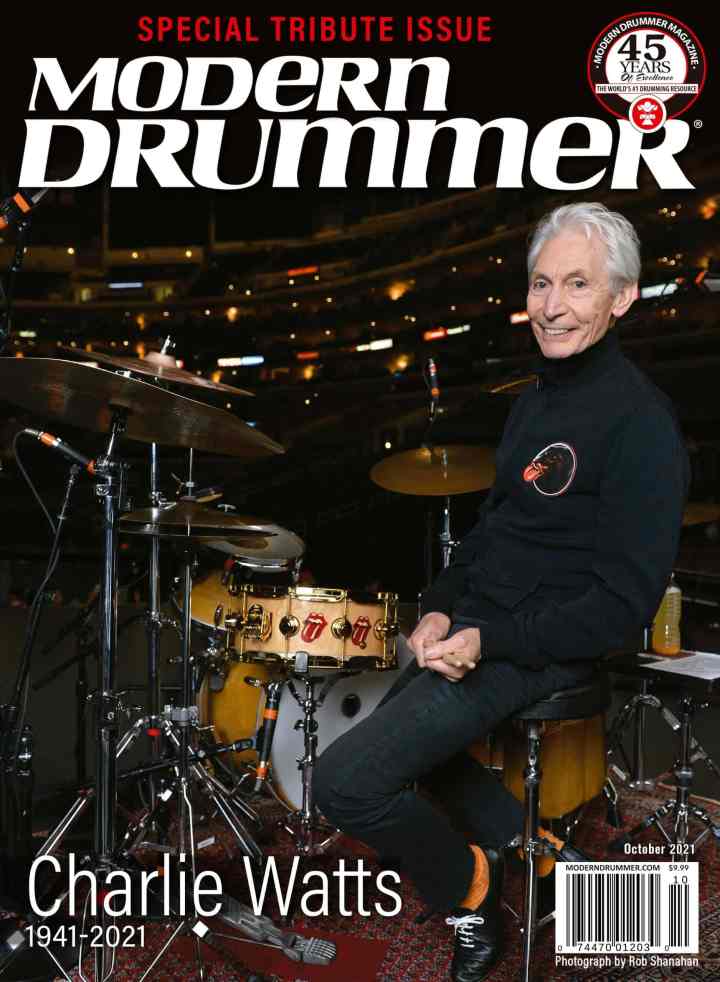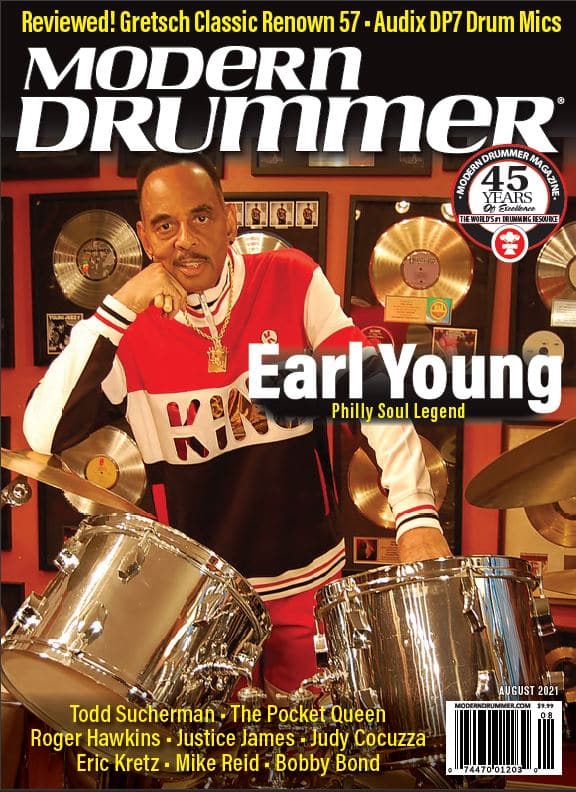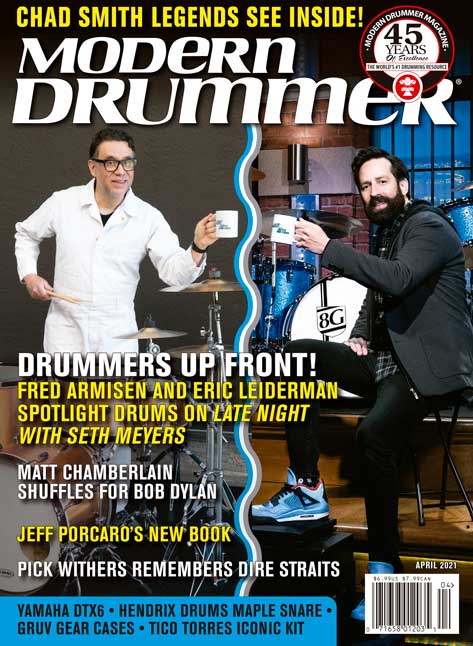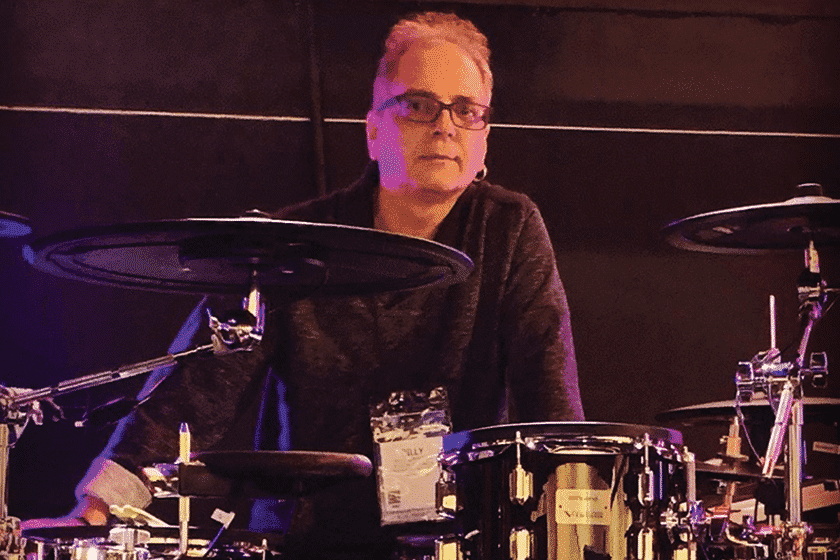Billy Amendola
Billy Amendola is a New York based, drummer, songwriter, studio musician, mentor, music industry consultant and producer, best known as a founding member of the seventies band, Mantus. The group released two albums, and three top ten Billboard dance singles. They achieved worldwide fame, touring the U.S., Canada and Europe.
Billy appeared on the 1987 debut album, of then teen sensation and eighties songstress, Debbie Gibson, Out of the Blue, combining the use of acoustic and electronic drums. The album spawned several international hits, including, “Only In My Dreams” and “Shake Your Love.” He received a triple platinum record award by the RIAA, for his contribution. His musical credits include television commercials, movie soundtrack albums and hundreds of 12” remixes. Billy has also performed as a special guest percussionist with Ringo Starr and his All Starr Band on several occasions.
He has been associated with Modern Drummer magazine, for twenty-five years, and is currently hosting a weekly podcast.
Early Life
Born William Michael Amendola in Brooklyn in 1957, Billy’s father, Vincent, an Italian immigrant and naturalized citizen served the United States during WWII. He was musically inclined, playing trombone in US Navy big band. His mother, Ann, was a stay-at-home mom who managed to be supportive and attentive to Billy’s early musical aspirations despite having to care for his disabled brother, five years his senior. Like many musicians of his time, Billy was inspired to take up drumming after seeing The Beatles perform on The Ed Sullivan Show in 1964. His father insisted on formal drum lessons and for his efforts, Billy was rewarded with his own kit by his grandparents. Drumming became a way for Billy to keep himself busy while his parents were occupied with the care of his brother. Advertisement
Career Beginnings
Billy allied himself with older, local neighborhood musicians, watching and learning by imitation and by the tender age of fourteen, started his first professional band, Uncle Sam, comprised of friends, Frank DeCrescenzo and John Kaz. The group morphed into a new group, Gypsy after the addition of Jimi Braffett on guitar before finally completing the lineup in 1976 with Jimmy Maer on guitar, vocals and keyboards, calling the band, Mantus. Although the band mostly played rock covers of the day, they were always composing original music. They became popular performing at clubs, block parties and high school dances in and around the New York City metro area before moving to larger venues and hotels out of state.
By 1977, Mantus was playing at CBGB’s with the likes of punk bands Blondie, Television and the Ramones when then New York Times music critic, John Rockwell, referred to Mantus as “one of the best rock bands to come around in a long time.”
Transitioning from rock to disco came literally overnight when Mantus was playing at a virtually empty Trudie Heller’s in New York City late one night. They drifted into a half hour long version of The Commodore’s hit, “Brick House,” funking it up, much to the chagrin of the club owner but conversely to the delight of a patron, an African American gentleman, who as luck or kismet would have it, owned a small independent dance label. He offered the band an opportunity to cut a record, “Turn Around Boogie Down,’ featuring Diana Ross’ then keyboardist, Ray Chew. It was released in Canada and faired well enough to provide the band an opportunity to cut another record. Advertisement
Their next release, “Dance It Free Style” became a huge hit in multiple cities, charting at number two on major NY radio station WKTU for eight weeks. Mantus rode the success of their first hit, playing prestigious dance clubs across North America. The group now had a follow up album, Midnight Energy and 12” Single “Rock It To The Top” catapulting them to the top of the disco scene, playing at clubs like the legendary Studio 54, the Fun House and Roseland where they were voted “Best Up and Coming Group” in 1979.
By the third single, “Boogie to the Bop,” from Mantus’ second eponymous album the group was looking to “cross over” into pop. But after mismanagement and poor handling, they left the label and returned to their rock roots, performing at their former stomping grounds. They reinvented themselves into a pop rock genre but started to dissolve slowly due to differences in musical tastes, personal demands and the responsibility of starting families. In the mid-nineties, Mantus temporarily reunited to record and perform new material. The bonds of friendship managed to supersede their rise and fall and remains strong to present day. The group was inducted into the “Legends of Vinyl” Hall of Fame September 2021.
Studio Musicianship
In the late 1970’s and early 1980’s, Billy started a new journey into studio musicianship, where he pioneered the art of mixing acoustic and electronic drums, a recording breakthrough at that time. His work partnered Billy on sessions with Branford Marsalis, Najee, Paul Shaffer, Bashiri Johnson, Jocelyn Brown, Dolette McDonald, Ira Siegel and Tinkr Barfield among others. Billy paired with producers, Loris Holland, Bernie Worrell, Fred Zarr, Jellybean Benitez, John Morales, Mark Berry, Scotty Blackwell, Shep Pettibone, John Luongo and many more. A few of Billy’s album projects include, Alisha, Marlena Shaw, Nona Hendryx, Walt Williams (O’Jays), Tin Tin, Fred Schneider (B52’s), Dunn Pearson, Jr., Will Downing and on Harry Nilsson’s 2019 posthumously released album, Losst and Founnd, produced by Mark Hudson. Billy is also featured playing “the phonebook rhythm” on the first single “Another Day,”from RAM ON, the tribute record to celebrate the 50th anniversary of Paul & Linda McCartney’s RAM album out May 2021.
Advertisement
Slappers
In the nineties, Billy created a specialty flat drum stick he named Slappers. Slappers offered an alternative method of creating sounds on drums and cymbals
The innovative sticks have numerous playing applications including bells, blocks, bongos and timbales. The item was well received by his professional colleagues.
Modern Drummer
Billy’s career path took another turn when family and fatherhood made touring and time away from home a less than a desirable way to make a living.
Having been a spotlighted artist of Modern Drummer magazine, a monthly publication targeting the interests of drummers and percussionists, Billy often freelanced the journal’s famed festivals as an artist liaison. Over several years, Billy developed a close relationship with Modern Drummer founder and publisher, Ron Spagnardi. Spagnardi was impressed with the connections and associations that Billy had built during his storied career in the music industry and in 1997, Billy began working in an official capacity for the periodical. He began as an Adverting Assistant, utilizing his relationships with drum makers to increase the publication’s advertising revenue. Billy’s rapport with artists and manufacturers alike made him an invaluable asset. Billy made a profound impact in delivering his passion for music and most especially drumming through the magazine’s platform. Spagnardi served as mentor to Billy, grooming him to take on more responsibility at Modern Drummer. With this guidance, he quickly moved up the ranks to Associate Editor and presently Editor At Large. In 2003, Ron Spagnardi sadly passed away, shortly after Billy’s rise within the publication.
Amendola Today
Billy has reinvented himself over and over throughout his sustained and successful career, from live performer, songwriter, studio musician and music magazine editor while staying true to himself and his origins. His resilience keeps him pertinent in a constantly changing industry. Advertisement
In 2018, coming full circle, Mantus’ commemorated the 40th anniversary of the release of their first record by reuniting and recording a new album, EST 1976. The LP features nine new original songs and was produced by Billy’s son, Matty Amendola, who has followed in his father’s musical footsteps, boasting his own professional success. Butch Jones, who worked on their first single and album forty years earlier, returned to serve as engineer on this most recent project. EST 1976 was lauded by both fans and the industry alike. Music Connection magazine gave the album a coveted 9/10 review. Mantus received accolades from preeminent musical peers on this latest collaboration.
Giving Back
Inspired by his love of the art rather than the laurels, Billy has helped launch the careers of innumerable performers. He advocates for the rights of musicians, striving to help new artists to the forefront while encouraging established artists to remain relevant and seek the respect they deserve.
He is a consultant and co-host for David Fishof’s Rock N’ Roll Fantasy Camp, where attendees play, write and record music in professional rehearsal and recording studios alongside music industry legends. Advertisement
Billy lent his acumen to author/photographer, Jules Follett, on her book,
Sticks n’ Skins, a photojournalistic essay spotlighting drummers and their craft. He subsequently served on the advisory board of The Sessions, a foundation which focuses on empowering artists through education and real-world advice.
Billy is also an advisory board member of Little Kids Rock, a charitable organization which provides free music instruction and instruments to public school districts across the country. Over 1,000,000 youngsters currently participate in LKR programs nationwide.
Having spent forty plus years in the industry, Billy has experienced the ins and outs of music, media and marketing making him an ideal choice to provide creative yet practical techniques and strategies for both budding and established artists. Advertisement
Contact
For more information, sessions, producing, interviews or consultation, please email Billy at bdrumc@icloud.com or billya@moderndrummer.com






